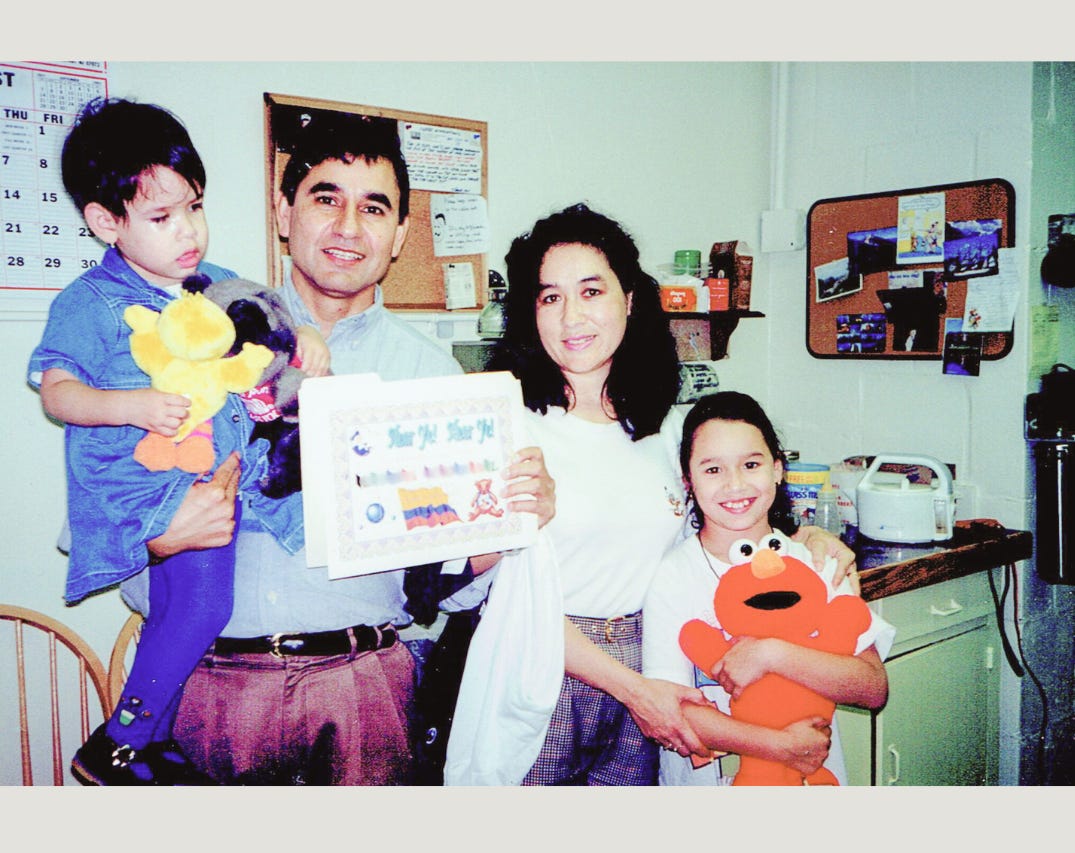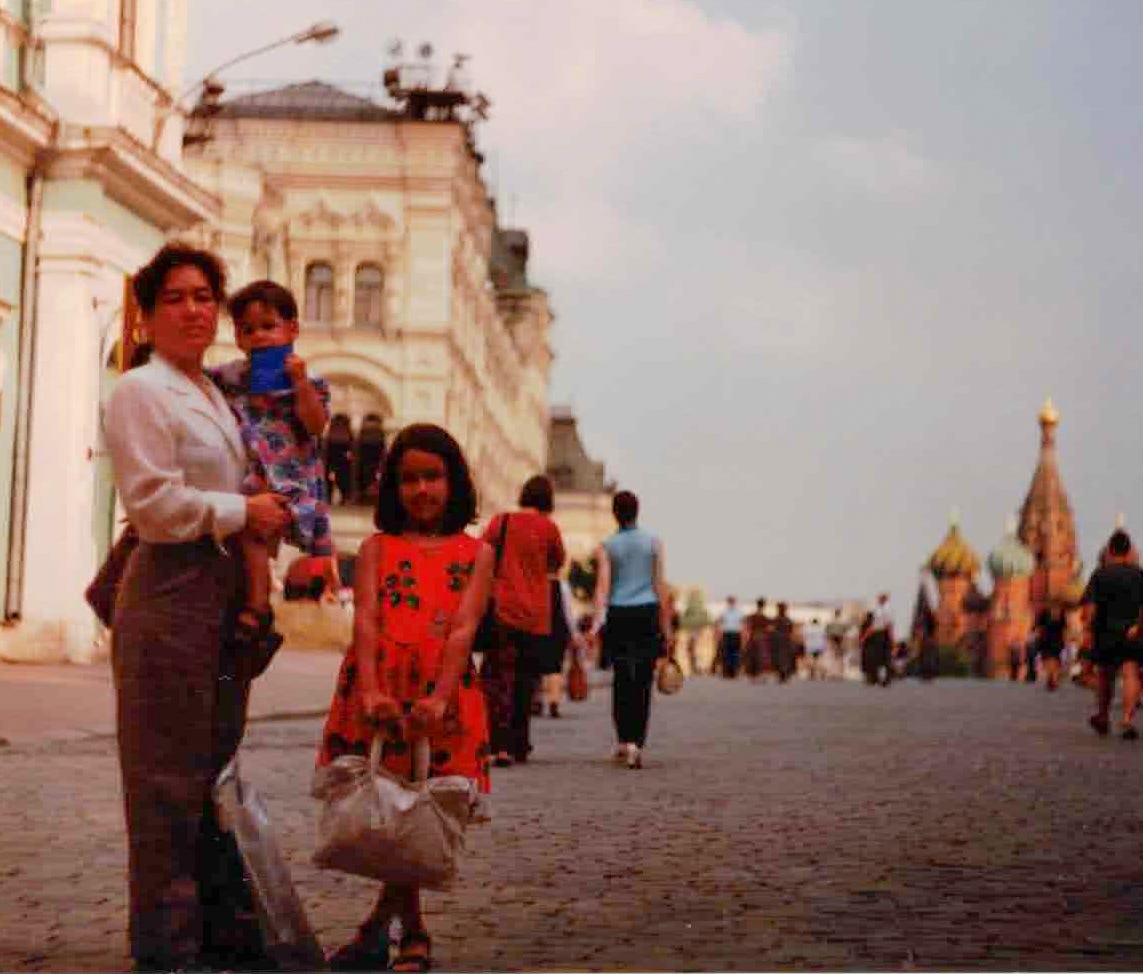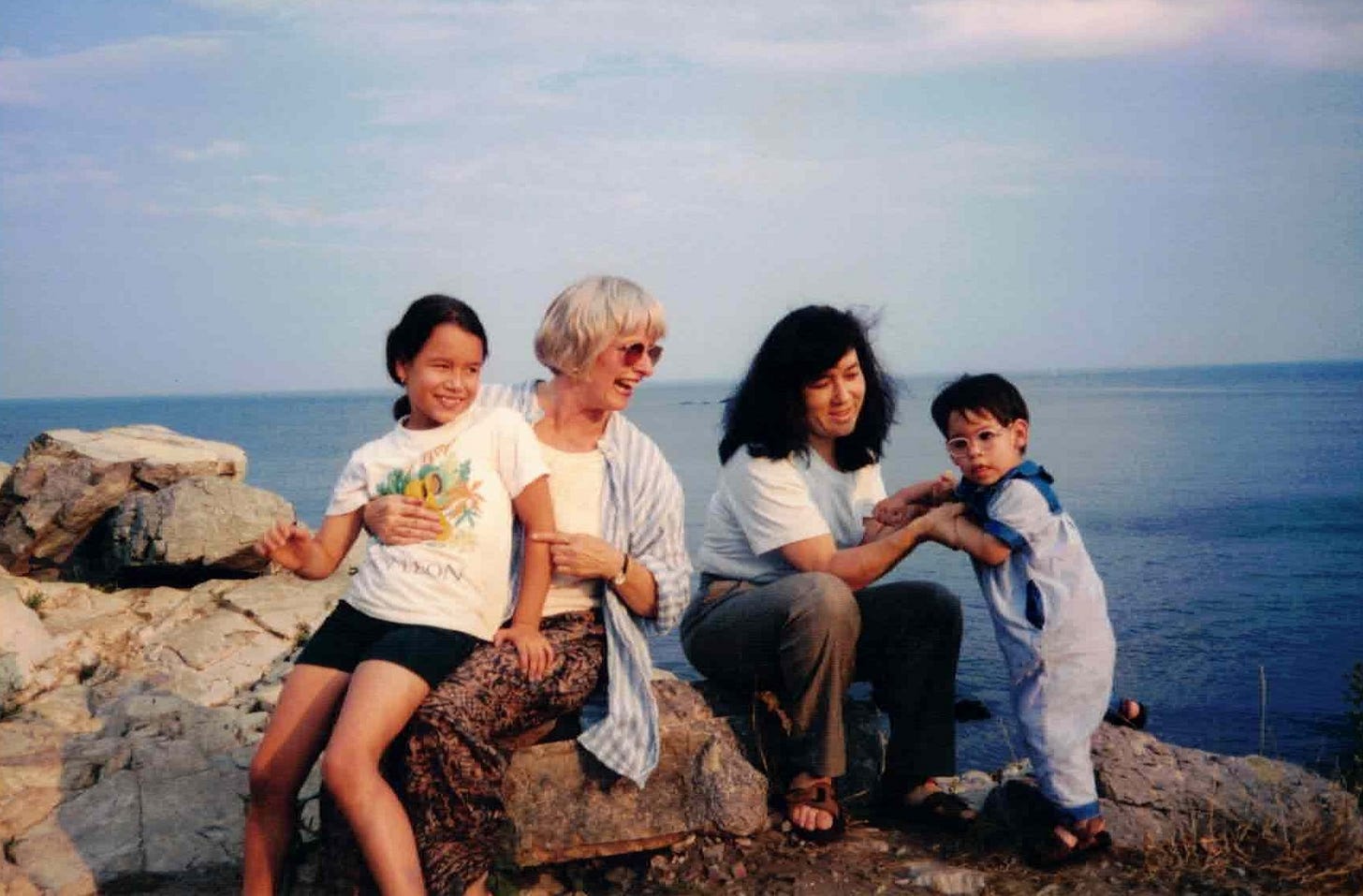Dear Reader,
I’ve been meaning to write you for a while now…
The world feels a bit… chaotic right now, doesn’t it?
In moments like these, I turn to stories of courage and resilience to keep my spirits up. Today, I want to share mine. Because I’ve lived through chaos before—times when life dragged me into a reality I didn’t choose, couldn’t escape, and desperately wished would end.
And you know what? It was all for the best.
Let me tell you my Immigration Story.
Once Upon a Time in Colombia…
You’d find me in a plaid skirt and white knee socks at a privileged girls’ school, rocking out to Shakira long before the world knew her hips don’t lie. Life was colorful and easy then—filled with small comforts I didn’t know were luxuries. I had a best friend I adored, a baby sister I was obsessed with, and was blissfully unaware everything was about to change.
When my little sister was diagnosed with retinoblastoma, a rare form of cancer that develops in the retina, doctors in Colombia told us there was no cure. She had a few months, give or take.
My parents refused to accept that prognosis. They were determined to at least try to save her life. But, to find a cure, we’d have to search the world.
And time was ticking…
Dial-Up Miracle
First, we flew to Moscow, where my dad had studied, but even their best hospitals couldn’t help. I didn’t fully understand what was happening, but I was happy to see the Red Square and grateful to be missing school for what was then, the trip of a lifetime.
It was 1997—the early days of the internet. My father’s hopeful eyes fixed on the computer screen as he sent out desperate messages, the dial-up tone screeching in the background.
And then—a reply. From a retinoblastoma survivor.
“Come to Boston” she said.
And so we did.
Boston, Baby!
Our visas were approved on my sister’s birthday (tell me that’s not magic), and two days later, we landed in Boston and headed straight for Massachusetts Eye and Ear Infirmary.
Early morning appointments. Afternoons in pediatric oncology. Meetings with radiologists and surgeons. For the first time, there was real hope.

Treatment was possible, but the risks were high. My sister had surgery followed by radiation in one eye. Unfortunately, the tumor spread to the other eye and would soon start making its way to the brain. She would need yet another surgery and more radiation.
To make matters worse, our tourist visas were about to expire.
Plot Twist: We’re Broke
Faced with the certainty of my sister’s death if we went back to Colombia, my parents chose to stay… and risk everything.
Fortunately, at the last minute, my dad was accepted into a graduate program, converting our tourist visas to student visas, which allowed us to stay legally for the duration of his program.
We moved into a small, cramped apartment. I couldn’t skip, hop, or even roll out of bed without our downstairs neighbors banging on the ceiling in protest.
All medical bills were out-of-pocket, and our entire life savings had gone toward my sister’s treatment. My parents had even borrowed money from relatives. Life required… an adjustment.
Translation: we were poor now.
At the time, I felt life had suddenly taken a sharp turn for the worse, leaving me stuck in a country far from home. I didn’t speak the language, didn’t have any friends, and had zero control over any of it. I still had my family, but even that felt different. My sister was sick and fragile, facing treatments that scared us all. My parents were shadows of themselves—constantly stressed, exhausted, and quick to anger. Sometimes, it felt like nothing I did was right. They were trying their best, but as the sibling of a child with cancer, my own needs often went unnoticed.
I felt like I was just there—floating, invisible—or worse, in the way.
Most of all, I missed my old life. I missed my best friend. And I missed me—the girl who had sparkled with confidence and felt safe in her surroundings just a few months ago.
My Fairy Godmother
I was in desperate need of a fairy godmother and right on cue, Gail arrived. She was a spry, sixty-something year-old woman who worked at the radiation facility and took us under her wing. When she heard we were traveling over an hour each day for appointments, she offered us a room in her home, just down the street from the hospital. It still amazes me, the trust she placed in us—opening her home (and her heart) to complete strangers, no questions asked.
Even after we moved out, Gail visited on weekends, arriving with warm hugs, baked goods, and little trinkets that felt like valuable treasures. She made it her mission to show us what Massachusetts had to offer, beyond doctor’s offices: sandy beaches, hikes along the coast, and my personal favorite—the latest movie at the theater, followed by cozy sleepovers at her place with her three cats.
Gail made me feel seen and special, showing me that even in dark times, there is always light. Those moments have become some of my most cherished memories from that chapter of my life.
The Price of a Miracle
After multiple surgeries and months of radiation, my sister’s scans finally came back clean.
The cancer was gone!
But it was a bittersweet victory because so was her vision…
A comfortable life in Colombia, financial security, my sister’s eyesight—all gone within months. The steep price of saving her life.
But we were grateful she was alive.
Now it was time to figure out how to make this new place, our home.
Gulp.
Sunday Scaries: Third Grade Edition
I started school halfway through third grade, terrified. Walking into a class of strangers, not knowing the language, being ridiculed for how I spoke and the food I brought from home was hard. The silver lining? We were learning multiplication tables, so at least I could understand something. And when school ended for summer break, I was mostly fluent.
I wish I could say things got easier from there, but they didn’t, not for a long time. My family was constantly strapped for money, navigating my sister’s disability was a challenge for us all, and as the most fluent English speaker, I became my parents’ translator, negotiator, and problem-solver. When something broke or my parents took a wrong turn or got lost driving, it was me trying to navigate us out of it. Whether it was helping with homework, explaining bills, or filling out forms, I had to step into adult shoes long before I was ready.
I will always hold a special place in my heart for immigrant children who find themselves in a strange land under difficult circumstances—through no fault of their own. Being an immigrant child means growing up fast, living between cultures, and facing uncertainty on a daily basis.
Yet, I’m so grateful I was one of them, because it has also meant having access to better opportunities. After a long period of deep discontent and yearning for home, I finally accepted our new reality. I discovered that focusing on the positive, even in hardship, wasn’t naïve; it was a survival skill that has sustained me to this day.
Globetrotting on a Budget
Want to know an unexpected benefit from those difficult first years in the U.S.?
I got an AP curriculum on humility, resilience, and gratitude. By nine years-old, I was well aware that life can change in an instant and it is up to us to find the specks of light in a dark tunnel.
We furnished our tiny apartment with donated furniture and mismatched, yard-sale treasures. I watched my parents start over in their 30s and 40s. My mom earned her GED and learned how to drive. My dad—who’d been a respected professor in Colombia— pursued a graduate degree here surrounded by classmates half his age. He persevered and I’ll never forget the joy in his eyes when he came home one day and exclaimed, “I DID IT!” after landing his first job in America, which (once again), extended our stay with a work visa.
Most days, our apartment building smelled like what you’d get if you mixed old carpet, stale air, and the brewing of spices from a dozen countries under one roof. But those rich scents and distant dialects down the hallways meant there was a different culture behind every door. And I, having gotten an early taste for adventure, was determined to travel the world—one neighbor at a time.
I volunteered to babysit all the kids in the building, which meant regular visits to my Albanian, Brazilian, Thai, Chilean neighbors. I made a friend from Russia and enjoyed talking to the parents of the Scandinavian boy who was half my sister’s age but somehow twice her size. I taught a graduate student from India how to rollerblade and sipped Argentinian maté with the grown-ups.
And, then—a gift from the Universe—Colombian families moved onto our floor.
If the Cops Don’t Come, Is It Even a Party?
Have you ever been far from home and instantly connected with a stranger from your homeland? That, times a million! (I mean, we’re Colombian) The simplest things are occasions for celebration. And celebrate we did!
Our apartment building became the unofficial party HQ.
We had music. We had empanadas. We had neighbors who definitely didn’t approve of the salsa dancing shaking their ceilings at 3 AM. The cops were called, many times.
But those parties weren’t just fun—they were essential... We were creating our “chosen” family, here in the U.S. They kept us connected to our roots, our culture, our people.
You see, at this time, returning to Colombia wasn’t an option. Our visas allowed us to stay in the U.S., but going back home—even for a short visit—risked everything. Not knowing when I would see my family again or gaze at Colombia’s green mountains was the hardest part.
We missed weddings and other milestones that were lived vicariously, through phone calls (which cost a fortune at the time—anyone remember international calling cards?)
Oh well… At least my “new family” all lived in the same building!
And most importantly, my sister was getting the chance to live a full life, learn, and grow like any other kid, despite her disability.
Green Means Go [Home]
After many years, the day we had long awaited arrived.
My father’s job sponsored our permanent residence (green card), which allows you to live and work in the U.S. without fear of losing your status. For immigrants, it’s more than a card—it’s safety. Stability. The freedom to build a future.
It took ten years.
But finally, we could return to Colombia.
I had left at eight.
And returned at eighteen.
I don’t have the words to express how wonderful it was to see my grandmother, uncles, aunts, and cousins again. All I can say is, it was magical. Ten years had passed, but the love had grown.
Of course, time had also changed everything: my childhood home was now occupied by others, my best friend and I had grown into different people, and the streets I remembered felt both familiar and foreign at the same time.
At the end of that summer, I returned to the U.S., this time by choice.
Plot Twist: We Won the Lottery?
I went to college with a clear goal: to pursue medicine in a country where treatment is available for conditions that are a death sentence elsewhere. I wanted to give back to the community that nurtured us–and help newcomers in similar situations.
And so, I did.
And then, one year after graduating college, WE BECAME U.S. CITIZENS!
It felt like winning the lottery. But the reality was much sweeter: we had achieved the American Dream.
Yes, it took that long—fifteen years after first setting foot on American soil.
Fast forward to today, and we’ve come full circle: my sister is a mental health counselor in Cambridge, and I’m a physician associate (PA) serving the Greater Boston area.
And my parents? They’ve worked hard, in every sense of the word. My dad, an engineer, has also delivered pizzas, driven Uber. My mom has cleaned homes and offices, delivered flowers, worked weekends, holidays, and nights.

I know my family’s story isn’t unique in its resilience, or the way it has come full circle to give back. Like the waves of immigrants before us—from the Italians to the Irish— immigrants aren’t here to take; they’re here to contribute to the rich fabric that keeps this country going, in return for safety, freedom, and the right to pursue happiness.
Often, that means taking the hardest and lowest-paying jobs while holding onto the hope that one day they, too, can buy a home, send their kids to college, and find work with better hours and benefits. Whether it’s a healthcare provider, housekeeper or Uber driver, we have all benefitted from the work of an immigrant in our community.
I often reflect on how lucky we were. Lucky to find kind, generous people who helped us transition to life in America. Lucky we never had to face the challenges immigrants face today: separation, racism, danger for being at the wrong place at the wrong time, or simply existing. Lucky to have the resources and time to wait nearly two decades for citizenship.
Not everyone is that lucky...
So maybe, in a way, we did win the lottery…
With love,
- Laura the Optimystic 💋







This is so beautifully written and such an important perspective to share. Everyone building a life with the added burdens of immigration should be a source of national pride. I'm very proud to call you a friend and grateful you published this - it'll be required reading for my kids.
Oh Laura!
This is a well written, wonderful story that more people need to read!
I am so glad our paths crossed in our lives❤️
God’s blessings to you🙏